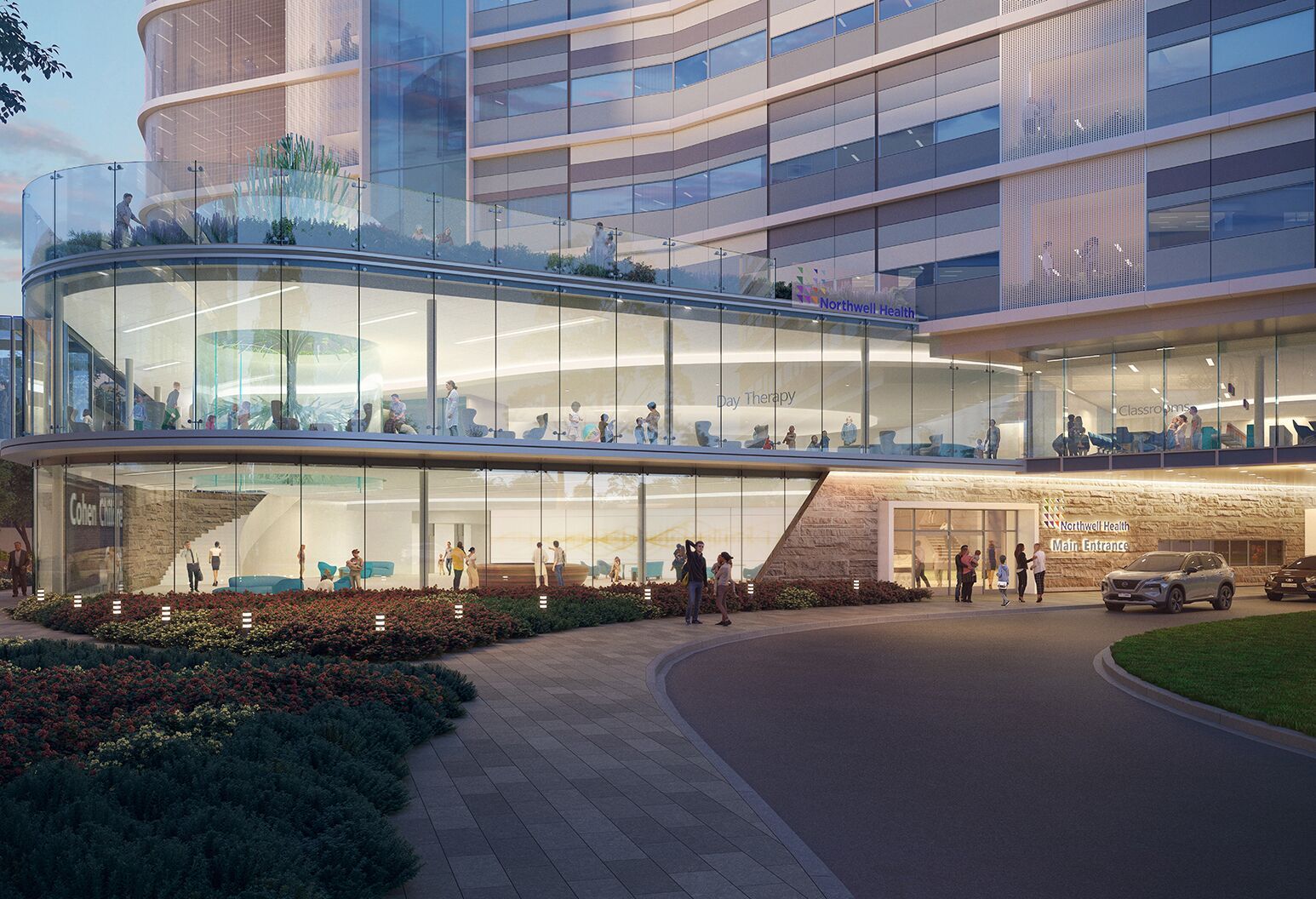Inside Northwell Health’s $500M pediatric mental health initiative
The campaign calls for a new building connected to Northwell's children’s hospital. Northwell’s Charles Schleien talks about the effort and the crisis affecting kids.
With more children and teens seeking treatment in mental health emergencies, Northwell Health is making a $500 million investment in hopes of making a difference.
Northwell Health is planning to build a Child and Adolescent Mental Health Pavilion. It will be connected to both Cohen Children’s Medical Center and Zucker Hillside Hospital. (Image: Northwell Health)

The New York system is investing $350 million over the next five years and is looking to raise an additional $150 million. Northwell plans on building a Child and Adolescent Mental Health Pavilion. It will be connected to Cohen Children’s Medical Center and Zucker Hillside Hospital, an adult mental health facility, in Queens, N.Y.
It’s a big project matching the need, says Charles Schleien, senior vice president of pediatric services at Northwell.
“We felt that this was necessary given what's going on in our communities,” Schleien tells Chief Healthcare Executive®. “You know, terrible epidemic of severe mental health issues in kids and particularly adolescents, high suicide rates, you know, never been seen before.
“All of this is going on all over the country,” he says. “And the fact of the matter is mental healthcare, for kids particularly, has always been under-resourced.”
Hospital and healthcare leaders have said they are treating more children with mental health emergencies than they had before the COVID-19 pandemic, but they say the crisis has been building for years.
Northwell may be seeing a smaller number of kids with mental health emergencies than at its peak in the pandemic, but Schleien quickly adds, “Where we're leveling out is at a much higher level than we were pre-pandemic.”
“It's still at a much higher level than we had seen three years, three, four years ago,” he says.
Northwell has teamed with school systems to provide more resources and has worked to expand access to mental health services. The system has also been putting more mental health workers in pediatric practices so they can see kids more easily, Schleien says.
Even with those steps, Schleien says the system has been “inundated” with children in crisis.
“The feeling was we should do something that also attempts to relieve some of the inpatient needs for these kids,” Schleien says.
Northwell plans to build a 200,000-square-foot building that will include more than 100 inpatient beds. It will also house specialty ambulatory clinics. Northwell announced the project at an event at Citi Field to commemorate the 40th anniversary of Cohen Children's Medical Center on Nov. 7.
The project is designed to put kids with mental and physical health issues under one roof, which Schleien says is an important aspect of the initiative.
“Kids with chronic mental health issues tend to have more other chronic diseases,” Schleien says. “And kids with chronic disease tend to acquire more mental health issues.”
Physicians in the children’s hospital and the mental health pavilion will be connected, and doctors will be able to address all of the needs of kids. Schleien also says having the mental health pavilion connected to the Cohen Children’s Medical Center may make it easier for families to seek their services.
“A parent is taking a child into a children's hospital, not into a psychiatric hospital, per se,” Schleien says.
Northwell is seeing a lot of children and teenagers struggling with depression, and is seeing suicide attempts among young people on virtually a daily basis, Schleiein says.
Northwell’s eating disorder clinic is also seeing a great deal of patients.
The Centers for Disease Control and Prevention has estimated that as many as one in five children experience some type of mental health disorder annually. Suicide is the second leading cause of death for those between the ages of 10 and 14, according to CDC data.
Realistically, it will probably take five years to build the mental health tower, Schleien says. Fundraising always has its challenges, but Schleien says the $150 million philanthropy target is a realistic goal.
“It's going to be tough, but there's been tremendous support thus far,” Schleien says. “And we have a wonderful group of donors and supporters of the children’s hospital. Frankly, I think this is a topic that resonates with everybody that has somebody in their family affected by some severe mental illness, or they’re close to someone who does.”
Donors and knowledgeable people also recognize that Northwell isn’t making the substantial investment in mental health because the system sees it as a profitable exercise financially.
“This is not a moneymaker,” Schleien says. “This is a money loser.”
Michael Dowling, Northwell Health’s president and CEO, says the project fits in with the system’s efforts to provide better care for children and teens.
“We know mental health is health,” Dowling said in a statement. “Our mission to treat patients fully also includes the mental wellbeing of our young patients.”
Help is available
988 Suicide & Crisis Lifeline: Dial or text 988 to connect with someone. Help is available 24/7.
Healthcare leaders: Prepare for a very different HIPAA security rule | Viewpoint
April 20th 2025The proposed changes to the HIPAA Security Rule are significant. Executives and boards need to prepare as the days of voluntary compliance end and a new era where leaders are held personally accountable emerges.